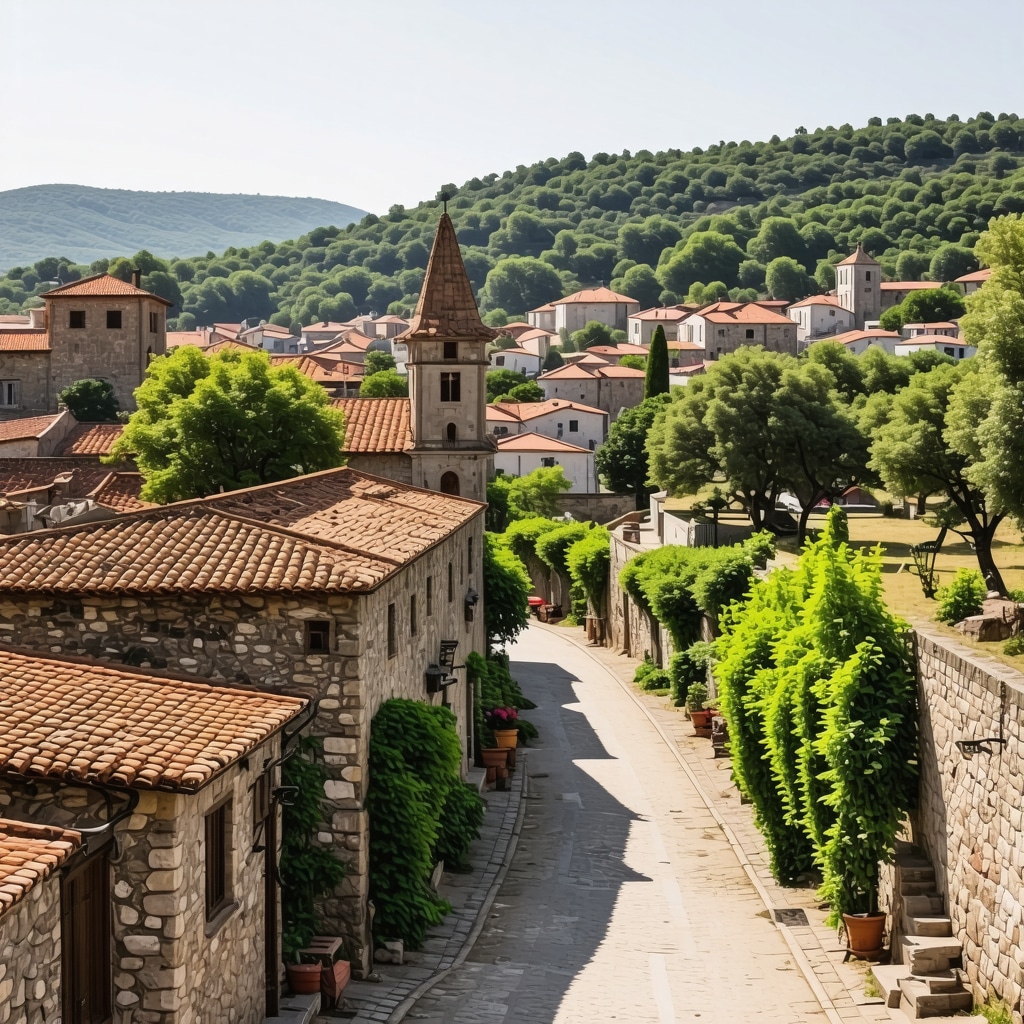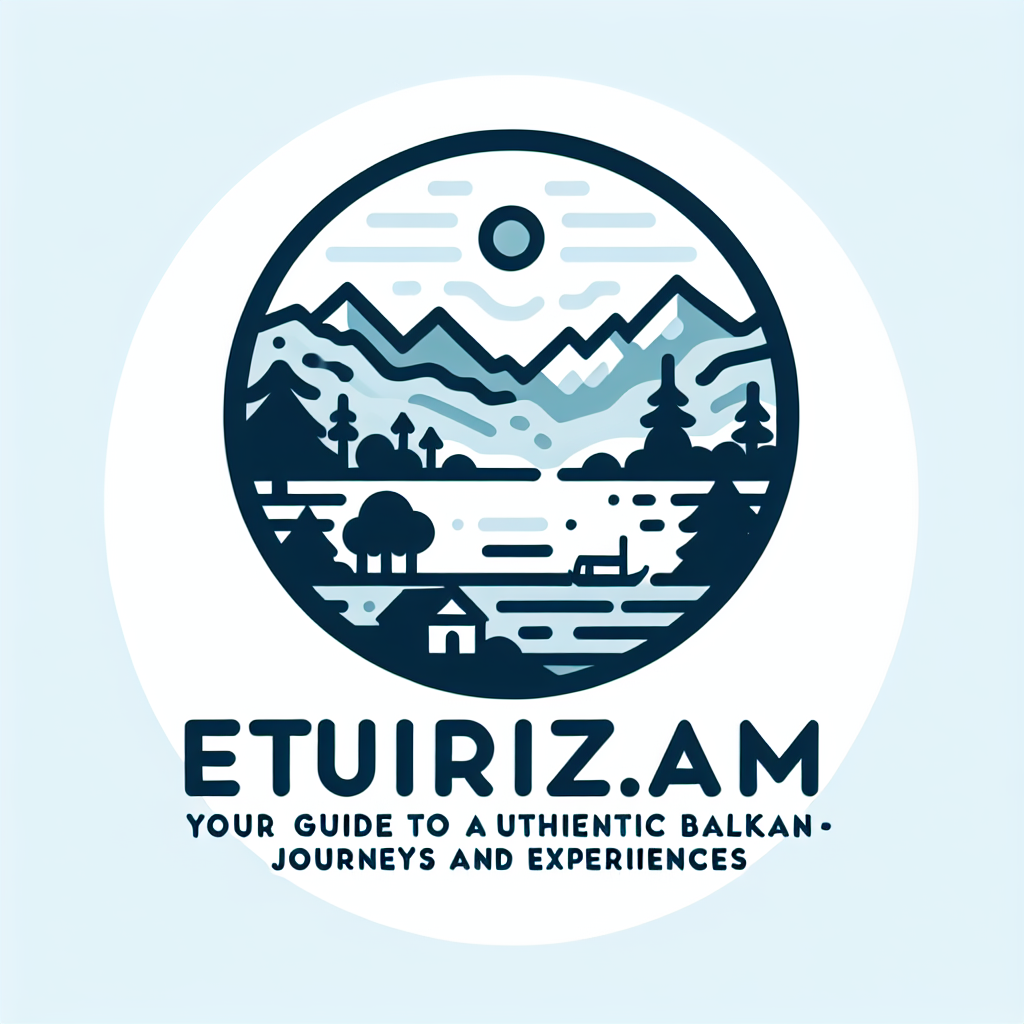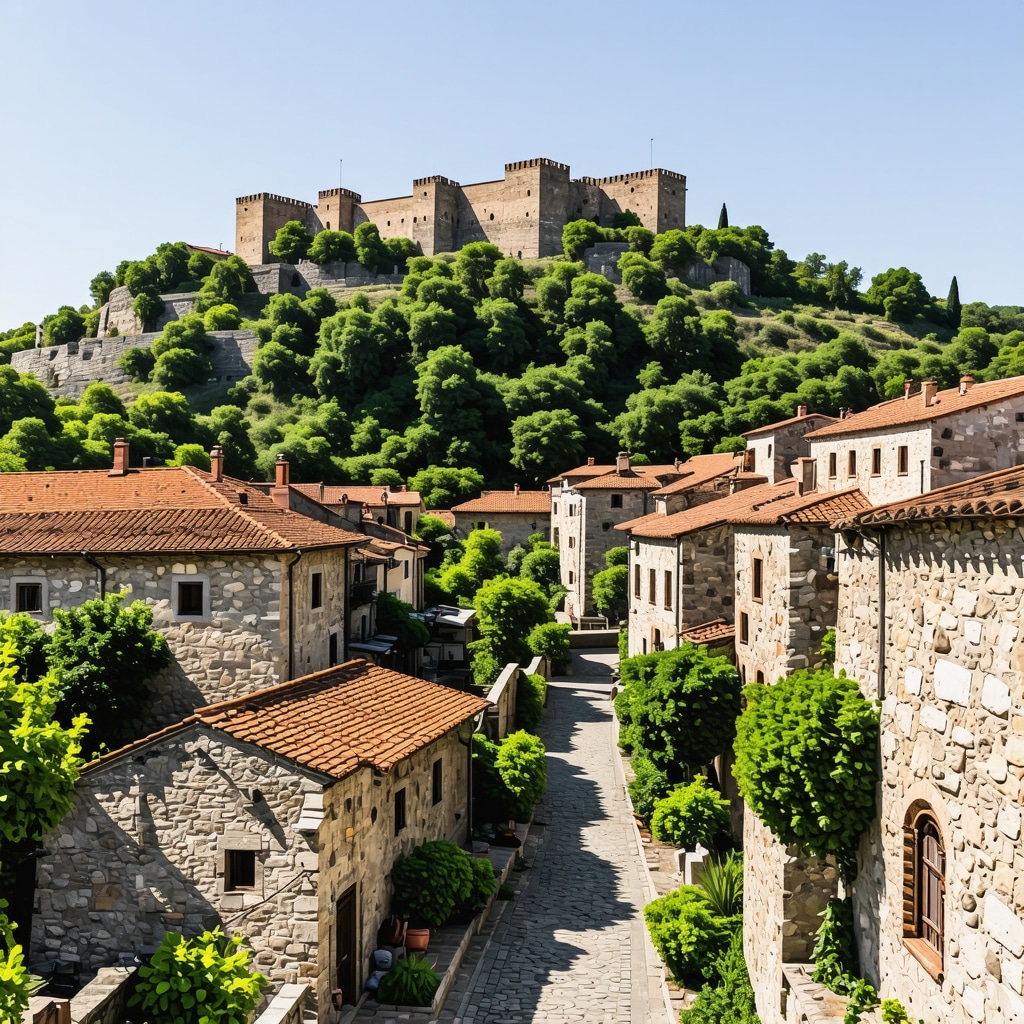Discovering Veliko Tarnovo: A Personal Journey into Bulgaria’s Medieval Heart
As someone passionate about history and culture, I vividly remember my first visit to Veliko Tarnovo, Bulgaria’s ancient capital. The moment I stepped onto its cobbled streets, I felt transported back in time, immersed in the echoes of medieval Bulgaria. The city’s dramatic hills, stunning architecture, and rich heritage make it a must-visit destination in 2024.
Why Veliko Tarnovo Continues to Captivate Travelers
What makes Veliko Tarnovo so special? For me, it’s the perfect blend of history, scenic beauty, and vibrant local life. The well-preserved Tsarevets Fortress, perched atop a hill, offers panoramic views and a fascinating glimpse into Bulgaria’s past. Walking through its ancient walls, I could almost hear the footsteps of kings and warriors who once ruled here. The city’s traditional houses, narrow alleyways, and lively markets create a charming atmosphere that keeps drawing visitors year after year.
My Top Experiences in Veliko Tarnovo
One unforgettable moment was watching the sunset from the fortress walls, when the golden light bathed the city in a magical glow. I also enjoyed exploring the Samovodska Charshiya, a street full of artisan shops and cafes where I sampled local delicacies. For a deeper understanding of Bulgaria’s history, I visited the Archaeological Museum, which is packed with artifacts that tell stories of ancient civilizations.
What Are the Hidden Gems I Discovered?
Beyond the main sights, I found the quiet Monastery of the Holy Transfiguration, nestled in the nearby hills. Its serene atmosphere and stunning frescoes made it a perfect retreat from the bustling city. Additionally, I learned from Bulgarian tourism experts that Veliko Tarnovo’s cultural festivals, like the annual Medieval Festival, offer immersive experiences that bring history to life. For more insights on Bulgaria’s historical sites, I recommend reading this comprehensive guide from here.
How Can I Make the Most of My Visit to Veliko Tarnovo?
If you’re planning a trip in 2024, I suggest staying in a traditional guesthouse to enjoy authentic Bulgarian hospitality. Don’t miss the chance to hike up to Tsarevets at dawn — the early morning light offers a spectacular view. Also, try local dishes like banitsa and lyutenitsa at the city’s cozy taverns. Sharing your experiences or tips can help future travelers — feel free to leave a comment below or explore more about Bulgaria’s diverse destinations.
Unveiling the Lesser-Known Gems of the Balkans: Why They Deserve Your Attention in 2024
The Balkans are often celebrated for iconic destinations like Dubrovnik, Sarajevo, and Belgrade, but beneath the surface lies a wealth of lesser-explored cities that promise authentic experiences and rich history. As a seasoned traveler and cultural enthusiast, I’ve uncovered many hidden treasures across this vibrant region, and I’m excited to share insights that will inspire your journey in 2024.
What Makes These Hidden Balkan Cities Stand Out?
These cities, often overshadowed by more famous counterparts, boast unique architectural marvels, untouched traditions, and welcoming communities. For example, the ancient town of Shkup (Skopje) reveals a fascinating blend of Ottoman, Byzantine, and modern influences, making it a living museum for history buffs. Similarly, Ljubuski in Bosnia offers picturesque landscapes and a chance to experience authentic Balkan hospitality away from tourist crowds.
Experiencing Authentic Balkan Culture in 2024
Traveling to these lesser-known destinations allows you to immerse yourself in local customs, traditional music, and regional cuisine. For instance, exploring the ancient monasteries in Rila, Bulgaria provides a spiritual retreat and an appreciation for centuries-old craftsmanship. Engaging with local artisans in Ljubljana or sampling traditional dishes in Himara enhances your cultural understanding and makes your trip memorable.
How Can You Prepare for an Authentic Balkan Adventure?
To truly embrace these destinations, I recommend researching local customs, learning basic phrases in the native language, and respecting regional traditions. Booking accommodations in family-run guesthouses or boutique hotels can provide a more intimate connection with the community. Also, consider participating in local festivals or workshops, which often feature traditional dance, crafts, and culinary experiences. For detailed itineraries and tips, check out this comprehensive European travel guide.

Image Description: Scenic view of a charming Balkan city with historical architecture and lush landscapes, ideal for inspiring an authentic travel experience in 2024.
Are There Risks or Challenges in Exploring Lesser-Known Balkan Destinations?
While these hidden gems offer unparalleled authenticity, travelers should remain aware of logistical challenges such as limited transportation options, language barriers, and varying infrastructure quality. It’s prudent to plan ahead, have local contact information, and stay updated on travel advisories. Engaging with local guides can also enrich your experience and provide safety, especially when exploring remote or less-developed areas. For more safety tips and travel advice, visit this detailed contact page.
Sharing your experiences or asking for recommendations in travel communities can help fellow explorers navigate these hidden Balkan destinations more confidently. If you’re eager to discover more about the region’s diverse cultures, history, and natural beauty, I encourage you to explore related articles and share your thoughts in the comments below. Your insights might inspire others to embark on their own Balkan adventures in 2024!
Embracing the Authentic Spirit of Veliko Tarnovo: My Personal Reflection
Reflecting on my journey through Veliko Tarnovo, I realize how deeply this city encapsulates the soul of Bulgaria’s medieval history. The cobbled streets, the ancient fortress, and the panoramic vistas evoke a sense of timelessness that I find rare in modern travel. Each visit feels like an act of rediscovery, where I not only explore a city but also reconnect with centuries of cultural resilience and artistic expression.
Why Personal Encounters with Lesser-Known Balkan Cities Matter
My experiences have shown me that these hidden gems are more than just scenic spots; they are living stories waiting to be uncovered. For instance, wandering through the quiet alleys of Ljubuski, I felt a genuine warmth from local artisans who shared their traditions with pride. Traveling beyond the popular destinations allows for a deeper engagement with regional identities, making every journey uniquely meaningful.
Advanced Insights into Balkan Cultural Preservation
One aspect I’ve come to appreciate is how these cities actively preserve their cultural heritage amidst modern influences. The monasteries in Rila or the ancient monasteries in Medugorje serve as spiritual anchors, maintaining centuries-old practices. According to recent studies, such preservation efforts are crucial for sustaining regional identities in a rapidly globalizing world. Engaging with local festivals or workshops, like traditional dance or craft-making, offers an immersive experience that transcends typical sightseeing and fosters genuine cultural exchange. For more detailed insights, I recommend exploring articles on Balkan cultural heritage.
What are the nuanced challenges in exploring these regions today?
Traveling in lesser-known Balkan destinations often involves navigating logistical hurdles such as limited transportation infrastructure or language barriers. However, these challenges can be transformed into enriching experiences by engaging with local guides who possess intimate knowledge of hidden spots and customs. Personally, I’ve found that such interactions deepen my understanding and appreciation of the region’s complexities. Planning ahead and respecting local traditions are essential for a respectful and rewarding journey. For comprehensive safety tips, I always check the travel advisories and community recommendations.
Sharing your stories and tips in travel communities not only enriches your own experience but also helps others discover the region’s authentic charm. I invite you to comment below with your own insights or to explore related articles on Slovenia and Hercegovina for further inspiration.
Capturing the Essence of Balkan Natural Beauty and Cultural Heritage in 2024
From the serene lakes of Ohrid to the rugged peaks of Zabljak, the Balkans offer a diverse tapestry of landscapes that mirror their rich history. I’ve always believed that natural environments play a pivotal role in shaping regional cultures—each mountain, river, and forest tells a story of survival, adaptation, and identity. Exploring these areas with an open heart reveals layers of meaning that go beyond the surface.
The Power of Personal Stories in Promoting Sustainable Tourism
In my travels, I’ve learned that personal narratives have the power to foster sustainable tourism. Sharing your experiences—be it a quiet hike in the Albanian Alps or a cultural festival in Montenegro—can inspire responsible travel practices. Supporting local businesses, respecting traditions, and engaging with communities ensures that these destinations remain vibrant and authentic for generations to come. For a deeper dive into sustainable travel strategies, visit this comprehensive guide.
How can travelers actively contribute to the preservation of Balkan heritage?
By choosing eco-friendly accommodations, participating in community-led activities, and sharing stories that highlight local efforts, travelers can become catalysts for positive change. Personal engagement and conscious choices are vital in maintaining the region’s authenticity. I encourage you to document your journeys and share them online—your voice can inspire others to explore responsibly and respectfully.
Unearthing the Layers of Veliko Tarnovo: A Deep Dive into Bulgaria’s Medieval Legacy
My fascination with Veliko Tarnovo extends beyond its picturesque vistas and historic landmarks; it lies in the city’s intricate tapestry of cultural resilience and architectural ingenuity. During my recent explorations, I delved into the city’s less-trodden alleys, discovering remnants of the Second Bulgarian Empire that continue to whisper stories of sovereignty and artistry. Visiting the ancient Tsarevets Fortress, I was struck by the strategic ingenuity of medieval Bulgarian engineers, whose mastery is evident in the fortress’s robust walls and intricate battlements. Analyzing these structures through the lens of modern archaeology, I learned from experts that such fortifications exemplify adaptive military architecture, blending functionality with aesthetic grandeur, as detailed in recent studies by the Bulgarian Academy of Sciences.
The city’s vibrant craft traditions, especially in woodwork and iconography, reveal a community dedicated to preserving its artistic heritage. Engaging with local artisans, I gained firsthand insights into techniques passed down through generations, enriching my appreciation of Bulgaria’s intangible cultural assets. These personal interactions underscored the importance of supporting sustainable heritage tourism, which balances preservation with contemporary vitality. For a comprehensive understanding of Bulgaria’s cultural conservation efforts, I recommend exploring this detailed resource.
Why Do These Lesser-Known Balkan Cities Offer Unparalleled Authenticity?
Traveling through the Balkans, I’ve realized that the true essence of the region manifests in its less commercialized towns, where history is woven into daily life. In cities like Ljubuski or Medugorje, the authenticity lies in the palpable continuity of tradition amid modern influences. Exploring these areas, I encountered local festivals that celebrate centuries-old customs, such as the annual medieval reenactments or religious processions, which serve as living museums of regional identity. Such experiences are invaluable for understanding how these communities navigate cultural preservation in a globalized era.
My insights are supported by recent anthropological research emphasizing community-led initiatives that safeguard intangible heritage while fostering local pride. Engaging with local guides and participating in workshops—be it traditional music or culinary arts—has been instrumental in enriching my journeys. If you’re interested in immersive cultural experiences, I suggest reviewing these curated suggestions.
What Are the Most Effective Strategies for Responsible Exploration of Balkan Heritage Sites?
From my perspective, responsible tourism hinges on a respectful approach: engaging with authentic local communities, supporting eco-friendly accommodations, and actively participating in cultural exchanges. For instance, I always advocate for booking stays in family-run guesthouses, which foster genuine connections and economic sustainability. Additionally, educating oneself on regional customs and language basics enhances mutual respect and understanding. According to UNESCO’s guidelines on heritage tourism, such practices are crucial for ensuring the longevity of cultural landmarks and traditions.
If you’re eager to deepen your understanding of Balkan heritage and share your experiences responsibly, I encourage you to connect with knowledgeable guides or explore dedicated resources. Feel free to leave your thoughts or questions below, as collective dialogue can further refine our appreciation and stewardship of these precious sites.
Beyond the Surface: Natural Beauty and Cultural Depth in the Balkans in 2024
The region’s landscapes—ranging from the shimmering lakes of Ohrid to the rugged terrains of Zabljak—are more than mere backdrops; they are repositories of cultural symbolism and historical memory. My adventures in these areas have taught me that natural environments shape regional identities, fostering a deep sense of belonging and continuity. Exploring the pristine forests and mountain peaks, I often reflect on the symbiotic relationship between nature and cultural expression, which is vividly evident in local folklore and artistic traditions.
Understanding this connection requires a nuanced appreciation of how environmental preservation supports cultural sustainability. Participating in eco-tourism initiatives, such as guided hikes or conservation projects, not only enriches personal experience but also contributes to regional resilience. To gain practical insights, I suggest reviewing this expert guide.
How Can Travelers Act as Stewards of Balkan Natural and Cultural Heritage?
From my experience, active participation—whether through responsible travel choices, volunteer work, or advocacy—makes a tangible difference. Supporting local eco-projects, reducing environmental footprints, and promoting awareness on social media are effective ways to amplify sustainable practices. Sharing compelling stories and visuals of preserved sites can inspire others to follow suit, cultivating a regional ethos of care and respect. Engaging with community-led initiatives not only enhances personal fulfillment but also ensures that these treasures endure for future generations.
Things I Wish I Knew Earlier (or You Might Find Surprising)
Uncovering Hidden Histories
One thing I wish I had realized sooner is how much fascinating history is tucked away in these lesser-known Balkan towns. Exploring places like Ljubuski or Medugorje, I was amazed to find centuries-old traditions still alive, often overshadowed by more popular destinations. It taught me that sometimes, the most authentic experiences come from wandering off the beaten path and engaging directly with local stories.
The Power of Personal Interactions
Early in my travels, I underestimated how much a heartfelt conversation with a local artisan or guide could deepen my understanding. Sharing a meal or a craft workshop opened windows into regional identity that no guidebook could offer. These moments remind me that genuine connections are the true treasures of responsible travel.
Natural Beauty Is More Than Just Scenery
I used to think natural landscapes were just beautiful backdrops. Now I see them as living parts of local culture—lakes, mountains, and forests that shape regional traditions and stories. Participating in eco-tourism or conservation activities enhances this connection and makes the experience more meaningful.
Challenges Are Opportunities
Traveling to remote spots often comes with logistical hurdles—language barriers, limited transport, or infrastructure issues. However, I learned to see these as opportunities to be more resourceful and respectful, which enriches the experience and fosters a deeper appreciation for regional resilience.
Local Festivals Are Cultural Time Capsules
Festivals like medieval reenactments or religious processions are like stepping into a different era. Attending these in less touristy towns allows for an immersive experience that truly captures the spirit of local traditions, making every trip unforgettable.
Resources I’ve Come to Trust Over Time
- UNESCO Heritage Sites: This organization offers reliable information on cultural landmarks and preservation efforts, helping me understand the importance of heritage conservation.
- Travel Guide by Lonely Planet: Their regional guides have consistently provided practical tips and cultural insights, making journeys smoother and more enriching.
- Local Tourism Boards: Official sites like Veliko Tarnovo Tourism or Balkan regional sites offer up-to-date, authentic info directly from the communities.
Parting Thoughts from My Perspective
Exploring the lesser-known Balkan destinations has profoundly changed how I see travel. It’s not just about ticking off sights but about immersing yourself in stories, traditions, and landscapes that breathe authenticity. If you’re curious about discovering hidden gems and embracing regional cultures, I encourage you to venture beyond the usual routes. Every new place offers a chance to learn, connect, and grow. If this resonated with you, I’d love to hear your thoughts—share your experiences or ask questions below. Happy travels!


Reading about Veliko Tarnovo truly rekindles my love for Bulgaria’s rich history and scenic landscapes. I visited a few years ago and was fascinated by how the city seamlessly blends medieval architecture with vibrant local life. The fortress overlooks the city in such a commanding yet picturesque way. One aspect I found particularly captivating was exploring the small artisan workshops in Samovodska Charshiya, where craftspeople still practice age-old techniques. It made me wonder, how do local communities manage to preserve these traditions amid modern influences? This kind of cultural continuity is so vital for authentic travel experiences. For those planning a trip in 2024, I recommend engaging with local guides; they can offer insights that no guidebook can provide. Also, staying in family-run guesthouses really enhances the connection with the local culture. Have others experienced similar efforts to preserve intangible heritage while traveling? Would love to hear your thoughts or tips from your own journeys to similar hidden gems in the Balkans.